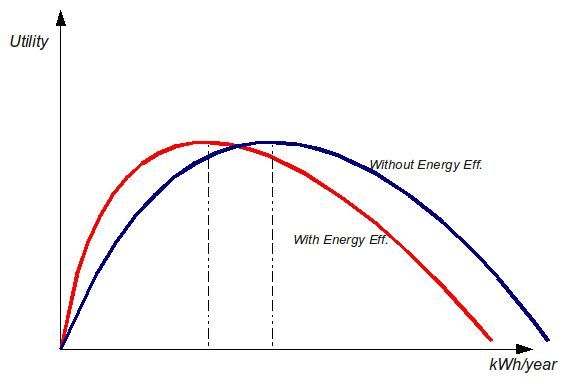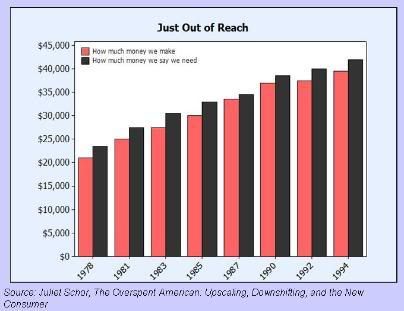Energy efficiency is one of the themes most discussed by those who are interested in issues regarding energy and the environment. The key question is how effective these proposed solutions will be. Will these technological solutions labeled as ‘energy efficiency’ (i.e. an increase in power plants generation efficiency, cogeneration, home insulation, more efficient electric motors, cars, light bulbs, etc.) really lead to a decrease in the global demand for energy?
First of all, we should distinguish between two different economic spheres: production and consumption.
With respect to production, the proposed solutions (increases in power plants efficiency, changes to EFF1 electric motors, inverters applied to pumps and motors, improvements in the efficiency of compressed air systems, etc.) will inevitably get caught in the trap of Jevons paradox. We should also remember that industrial development comes from a long history of efficiency increases in the use of productive resources, those being either energy or labor or credit or raw materials. (‘More with less!’ is the claim.)
Resource consumption has continued to increase in the long term, in spite of acknowledged gains in efficiency and productivity. Considering that, the myth of entrepreneurs reluctant to adopt available methods to increase efficiency should be abandoned: in fact, investment in energy efficiency should be considered business as usual.
On the other side, we should also remember that Jevons paradox applies exclusively to the production sphere: the world of the so-called ‘consumer’ behaves very differently. In this regard, the economic literature is still pegged to the Consumer theory developed by economists such as Walras, Pareto and other Marginalists between the late 19th and the early 20th century. This is exactly the same theory studied in Basic Economics courses.
According to Consumer theory, individuals choose the level of commodity consumption which, considering their own income and the price requested, maximizes their own Utility. The key point regarding this theory is that one of the theory's unproven principles - the axioms - predicts that, for each individual, utility always increases as the consumption of any commodity increases. Ironically, economists call it the Piggy Principle.
In an energy context, let's consider what happens when an individual buys a more efficient car—the same can be said for light bulbs, home insulation, and so forth. What happens is that, in order to achieve the same level of utility, the individual can consume less energy. However, if the individual is a cute piggy, he/she will not be satisfied with the same utility he/she reached earlier if he/she is able to reach a higher utility for the same expense!
In the figure below, this reasoning is made clear.

For example, this effect is perfectly exemplified when we consider that with a more efficient car, with the same expense, you can take a job further away from home or, with more efficient bulbs, you can get a better illumination by installing multiple lighting spots (the so called ‘Ikea effect‘), or by insulating your house or installing a more efficient boiler, you can increase your indoor winter temperature, going for example from 18 ° C to 22 ° C. This kind of change has really occurred, if we consider that the winter set-point temperature in Italian schools was around 10 C ° in the early 20th century!
To sum up, it is clear that, due to the Piggy Principle, energy consumption is not affected by efficiency improvements in products for families. Furthermore, as a consequence, if energy consumption does not change, neither does pollution from energy-related emissions.
However, this lack of change does not mean that efficiency improvements in consumer products should not be pursued or encouraged. The opposite is to be said!
Efficiency improvements in consumer products in fact have the great advantage of increasing the Resilience level of society. We are referring to Resilience in its engineering sense, i.e. in terms of resistance to rupture forces. Once again, the figure below clarifies this concept: in case of a substantial rise in energy prices, those who invested in efficiency measures are better off in comparison with those who did not. This can be helpful when facing the dilemma of taking part in riots or supporting the next war for resources.
Now let’s focus on another question: are we really piggies? Is it really possible that, in a given period of time, the more we consume the better off we are? The answer is obviously NO! How can you accept as an axiom that individuals, if they could, would drive cars 24/7 the whole year round? Also, how could anyone assume that people, if they could, would be better off with 120 kg of meat per day than if they ate only 1 pound per day? It is pretty clear that the Piggy Principle is a long way from reality.
What we need to admit is that beyond some level of consumption, Utility peaks and then begins to decrease.

This concept is only sketched in some economic texts (Hoffman, Binger). The point beyond which utility decreases is called the ‘bliss point’.
If a bliss point for each individual exists, why do figures show that this is never reached?
As a matter of fact, the consumption rate per individual has kept increasing in Western countries since the beginning of the Industrial Revolution. Moreover, some studies show that the need for money by individuals is never fulfilled.

Finally, if the bliss point exists, but figures show that individuals never achieve it, the correct question would be: how does it happen that the bliss point for individuals keeps moving further, becoming more and more unattainable? Why did we condemn ourselves to this constant Sisyphean challenge?

Several studies have provided answers to this question—beginning with V. Packard and other critics of E. Bernays (this is a nice video to start with). Bernays was Freud's nephew and is considered the inventor of propaganda and advertising modern techniques. Other studies reveal that some products themselves are designed to be ‘addictive’. One example is this research on fast-food conducted by Yale University. Yet another area of study relates to the proliferation of the so-called positional goods; in simple terms, these good are intended to stimulate consumption by leveraging social envy. Nate Hagens has made other studies of interest on the subject.
Going back to the problem of energy demand, we can now consider some of the policies that are proposed by different groups.
Some environmental organizations and movements support ‘halting economic growth.’ These organizations act in a beneficial way by informing the public about the benefits of a more sober life-style and the devastating effects of excessive energy consumption. We could argue that these campaigns help to avoid the constant displacement of individuals' bliss points.
We know, however, that it is extremely difficult to persuade a critical mass of a population with messages related to sobriety. We also know that the most effective persuader in determining the consumption level of a commodity is the price. Just by relying on price, it is possible to prevent the Piggy Principle from undermining the benefits of efficiency investments.
In regard to that, in recent days, the Dutch government has approved a very interesting proposal: it would replace the current ownership and sales taxes with a road tax by the kilometre (about 3€ cents/km, which, for a 15.000 km/year usage sums up to a total of 450 €!).
This policy focuses on the bulk of the matter: the road tax offsets the kilometric price decline perceived by those buying a more efficient car. So the Piggy Principle can't take effect and the final outcome is:
• Same mileage covered, so same 'Utility' reached by drivers
• Same total expenses for drivers
• Less liters of fuel sold, so less polluting emissions
But the more perverse side effects of this proposal need to be balanced in some way. Since mileage is a good on which the poor spend a higher percentage of their income than the rich, this is a regressive tax that might contribute to increase inequality. In addition, as with every carbon tax, it would be exposed to carbon leakage phenomena because of neighboring countries which do not apply it.
Thus, the findings regarding the Piggy Principle and the Jevons paradox lead us to the conclusion that energy efficiency issues are extremely sensitive. The simplistic solutions based on technology changes ALONE can prove to be a real boomerang.
By. Marco Bertoli
















